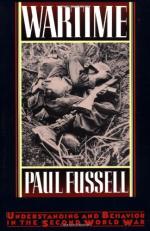
|
| Name: _________________________ | Period: ___________________ |
This test consists of 5 short answer questions, 10 short essay questions, and 1 (of 3) essay topics.
Short Answer Questions
1. How did advertisers change their strategies during the war?
2. Overall, the reading experience of most citizens and soldiers could best be described as which of the following?
3. Which of the following is NOT one of the things that American soldiers were told they were fighting for?
4. A typical soldier's amount of downtime would best be described as which of the following?
5. Overall, the example that Horizon set was which of the following?
Short Essay Questions
1. What was the importance of the literary journal Horizon?
2. What was the overall reading experience of citizens and soldiers like during the war?
3. How and why did the media fail to report the entire story of the war?
4. What types of stories would be most likely to be reported on?
5. Why did citizens in the US and England suffer from deprivation?
6. What does RADAR stand for?
7. How did advertisers think of and take advantage of the war?
8. How did the media imply God's involvement in the war?
9. When were more enduring war novels written and why were they written during this time period?
10. How did soldiers react to the media's presentation of the war?
Essay Topics
Write an essay for ONE of the following topics:
Essay Topic 1
Soldiers during the second World War had their self images systematically degraded and held in constant contempt.
1) Explain the concept of self-image and how it applies to the typical young American of the 1940s.
2) Discuss why it was necessary to destroy a soldier's self-image in order to cause that person to integrate well with the large machinery of the army of World War II.
3) Describe some of the effects that the aggressive campaign to destroy and degrade self-image had on common soldiers.
Essay Topic 2
Military training was intended to create capable and obedient soldiers. The extreme demands of World War II required military training to be short and intense.
1) Explain the purpose of military training.
2) Describe, according to military thinking of the time, the ideal soldier after he has just completed training.
3) Explain how some of the difficulties of WWII affected military training.
4) Discuss the similarities between military training and public school systems of the 1940s and explain why this similarity existed.
Essay Topic 3
When it entered into World War II, America was at a disadvantage in terms of its equipment, and struggled long and hard to correct these problems.
1) Explain the state of military equipment in the American army when the US entered the war. Discuss some of the problems in design, scale and distribution.
2) Describe some of the consequences of these inadequacies for American troops on the battlefield.
3) Discuss the process that brought America's army up to date and in line with modern standards.
|
This section contains 712 words (approx. 3 pages at 300 words per page) |

|




